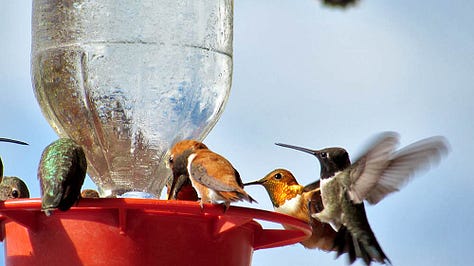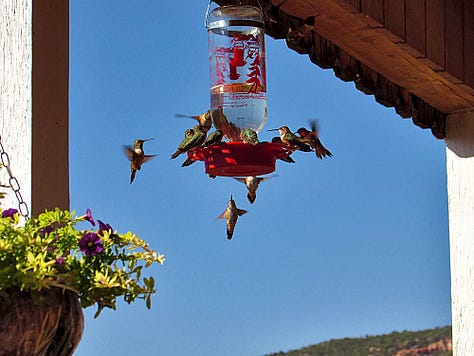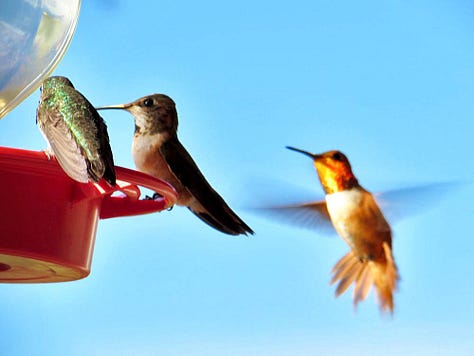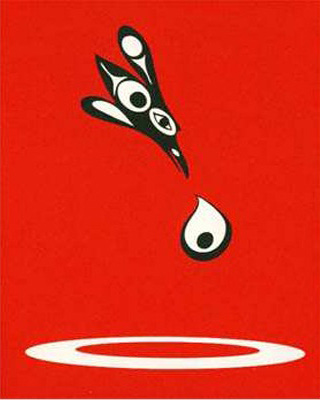A Hummingbird Fable,
and where it led me.
Sometimes I feel rather despondent when I consider the bleak future of our beautiful planet. A few days ago the Intergovernmental Panel on Climate Change (IPCC) published a new comprehensive report with a dire warning:
In the near term, global warming is more likely than not to reach 1.5°C even under the very low GHG [greenhouse gas] emission scenario (SSP1-1.9) and likely or very likely to exceed 1.5°C under higher emissions scenarios.1
This will result in more frequent heatwaves and droughts, floods, wildfires, catastrophic weather events, rising sea levels, pandemics, risks to food security, and a long list of other inevitable disasters UNLESS, the report says, a drastic shift away from fossil fuels happens within the near future. We’re close to an irreversible tipping point that can only be prevented if industrialized nations cut greenhouse gas emissions in half by 2030 and stop adding them to the atmosphere altogether by the early 2050s.
While the urgency of the report is necessary, it has two serious problems. For one, it is mostly focused on the effects climate change has for humanity. This is the wrong viewpoint because it is the very reason we’re in this mess. We humans have to internalize that we share this planet with countless other organisms and that equal measure should be given to their well-being. To think that we will keep humanity safe from future climate catastrophes while continuing to exploit and hurt a huge part of the natural world seems incredibly foolish and short-sighted.
Which brings me to the other pet peeve I have with the IPCC report: it barely focuses on the huge part that animal agriculture plays in the rise of greenhouse gas emissions. In a recent article I explained how the IPCC uses a wrong metric to reach their number for the emissions attributed to livestock (14.5 percent of global emissions) while it is at least over 50 percent, according to some scientists. Every one of us can make a difference when it comes to greenhouse gasses, simply by eating less or no animal products. Just think about it. And yet, the IPCC report mentions this hardly at all.



While I was feeling miserable, I found this:
According to an old Native American legend, one day there was a big fire in the forest. All the animals fled in terror in all directions, because it was a very violent fire. Suddenly, the jaguar saw a hummingbird pass over his head, but in the opposite direction. The hummingbird flew towards the fire!
Whatever happened, he wouldn't stop. Moments later, the jaguar saw him pass again, this time in the same direction as the jaguar was walking. He could observe this coming and going, until he decided to ask the bird about it, because it seemed very bizarre behavior.
"What are you doing, hummingbird?" he asked.
"I am going to the lake," he answered, "I drink water with my beak and throw it on the fire to extinguish it." The jaguar laughed. 'Are you crazy? Do you really think that you can put out that big fire on your own with your very small beak?'
'No,' said the hummingbird, 'I know I can't. But the forest is my home. It feeds me, it shelters me and my family. I am very grateful for that. And I help the forest grow by pollinating its flowers. I am part of her and the forest is part of me. I know I can't put out the fire, but I must do my part.'
At that moment, the forest spirits, who listened to the hummingbird, were moved by the birdie and its devotion to the forest. And miraculously they sent a torrential downpour, which put an end to the great fire.
The Native American grandmothers would occasionally tell this story to their grandchildren, then conclude with, "Do you want to attract miracles into your life? Do your part.
Of course, I wanted to find out where this Native American legend came from, which tribe told this story, and it didn’t really surprise me that I couldn’t track it down. There are indeed many stories about hummingbirds in Native American mythology, but this particular one wasn’t among them.
However, I found Flight of the Hummingbird (A Parable for the Environment) by Michael Nicoll Yahgulanaas. I encourage you to read it – the illustrations are stunning, in the style of Haida Manga. Yahgulanaas is a Haida and lives in the part of British Columbia which is now called Haida Gwaii, known until 2010 as the Queen Charlotte Islands. If you follow the links above, you’ll learn more about the Haida and their stunning art.
The foreword of the book is by Wangari Maathai, the first African woman to win the Nobel Peace Prize. She was also the first female professor ever in her home state of Kenya. I must confess I had never heard of her, but her biography is simply outstanding. All her life she fought for democracy, women’s rights, the environment, and against land grabbing, corruption, and misogyny. Her outspoken opposition to Kenya’s president at the time, Daniel arap Moi who was accused of human rights abuses and corruption, led to Maathai’s imprisonment and torture. After Moi and his party were finally defeated in 2002, she was elected to be part of the government, and in 2003 she founded the Green Party of Kenya.
Before that, in 1977, she started the Green Belt Movement, a grassroots organization which encouraged women to plant trees in order to improve their quality of life, to combat global deforestation, and to conserve the environment. Over 51 million trees have been planted, and many women have been able to make a living and be independent.
Here is a lovely video about her and her work:
I’m grateful that this little hummingbird story took me out of my funk and led me to these interesting people. I’ll take the moral of the fable to heart: rather than giving in to despair, I’ll just do my part, however little. One tiny drop at a time.
I’m using Firefox to edit and post this piece. It looks like that the culprit was Google Chrome; I still can’t upload images or format text in Chrome. I hope Substack will fix this.
And I have a question. Substack added the possibility to “Chat”, where you, my subscribers, could tell me where you live, post pictures of your pets, or we could discuss the meaning of life. Please let me know whether you’d like it.




This story is from the Quechua people of Ecuador and retold by other people around the world. Please make sure to include that to be in right relationship in sharing this story.
great story about the humming bird / i like your version best
great video / powerful / i'm glad i took time to watch it
if you can figure out how to use chat i'm interested
the message of empowerment is what i get from your post / everyone has to be empowered says wangari / that is a beautiful and powerful truth